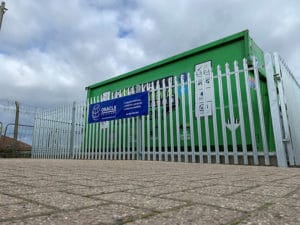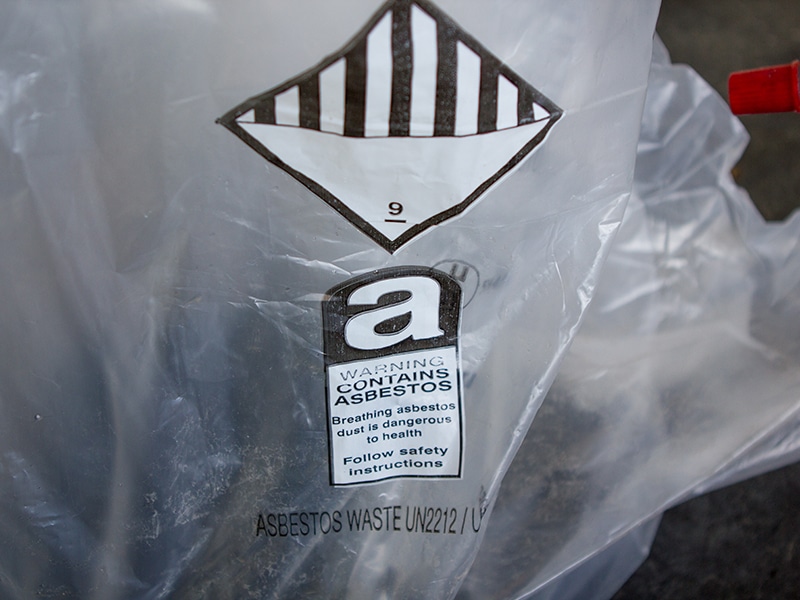Asbestos Disposal Guide: What You Need to Know
Asbestos can be a particularly hazardous material and for this reason specialist care needs to be taken in the event that it is discovered in a property where you have duty to manage responsibilities. The identification, removal and subsequent disposal of asbestos must be carried out by certified and trained professionals. As a company that focuses on providing asbestos removal and disposal services to commercial businesses throughout the UK, Oracle are well-placed to advise on all aspects of this process.
In this guide, we will highlight some of the considerations that you need to be aware of in relation to its presence, asbestos removal and its disposal, as material that contains asbestos isn’t the sort of thing that can be easily disposed of at a local recycling centre.
What is asbestos and why is it a hazardous material?
Asbestos is a naturally occurring silicate mineral that was routinely used as a building material on account of such qualities as its high tensile strength and resistance to chemical erosion.
The substance was especially popular for construction purposes in the 1960s, ‘70s and ‘80s. However, its use in the UK was banned in 1999 in light of the strong link between asbestos inhalation and serious, but often long-developing diseases like mesothelioma, asbestosis and asbestos-related lung cancer.
How is asbestos disposed of?
Asbestos simply being present on a given commercial site doesn’t necessarily mean it has to be disposed of; indeed, properly managed asbestos containing materials (ACMs) can often be left in place, depending on such factors as the asbestos’ type, condition and location.
If, however, as a consequence of a risk assessment made by professionals like our own here at Oracle Solutions, it is decided that the asbestos should be removed and disposed of rather than simply managed, you must not attempt to carry out this work yourself unless you have received suitable training and have the necessary equipment.
Any ACMs can be considered to be asbestos containing waste (ACW) once they are ready for disposal. Asbestos waste is any waste that consists of more than 0.1% weight-for-weight (w/w) asbestos, and its definition also includes contaminated building materials, personal protective equipment, damp rags used for cleaning, and tools that cannot be decontaminated.
While slightly different terms apply when you need to dispose of asbestos waste in England, Scotland and Wales, if you are to dispose of asbestos yourself, you must be trained to work safely with ACW. The waste material must also be packed in UN-approved packaging that sports a CDG hazard label and visible asbestos code information. The asbestos waste should be double bagged, wrapped and labelled, and the only people permitted to transport such waste are those with a waste carriers licence.
It is also crucial not to break up large pieces that contain asbestos waste. Such large pieces should instead be double bagged and wrapped in suitable 1000-gauge polythene sheeting and labelled accordingly.
Can I put asbestos in a skip?

If you cannot fulfil these requirements for carrying asbestos in a skip, you are urged to arrange for a registered waste carrier to transport it for you. For this you can contact an asbestos specialist such as Oracle Solutions or seek advice from your local county council.
What is the law in relation to commercial asbestos disposal?
In England and Wales, asbestos waste becomes ‘Hazardous Waste’ if over 0.1% asbestos is present. In this case, businesses disposing of the waste must abide by the Hazardous Waste Regulations 2005, and complete a Hazardous Waste Consignment Note.
A registered waste carrier must promptly and safely consign the ACW to a dump licensed to accept asbestos. There are some exceptions to this as far as both domestic and agricultural ACW are concerned, but in keeping with our own asbestos removal services being geared towards the needs of businesses, we will focus chiefly on the situation for commercial organisations looking to dispose of asbestos waste.
One key regulatory requirement for such firms, for instance, is “where hazardous waste is produced at, or removed from, any premises other than exempt premises, the premises must be notified to the Environment Agency”.
So, if your business is not exempt from this requirement and it produces such waste, you have a legal duty to register with the Environment Agency any premises that produces such waste. Each of your business’s premises that you register with the agency will be given a unique registration number called a ‘premises code’.
How will I know if my business is exempt from notification?
Premises that you won’t need to notify the Environment Agency about in the above manner include offices, shops and agriculture premises, to the extent that the hazardous waste arises from these premises’ use as offices, shops and for agriculture purposes respectively.
To be exempt from the notification requirement, the aforementioned premises must produce less than 500kg in any 12-month period. If any given premises of the above produce more than 500kg in any 12 months, they will cease to be exempt, and the business owner will need to let the Environment Agency know of this.
There is, however, one other circumstance in which notification will not be needed for particular premises that produce waste – the contractor removing the ACW has registered their principal address and runs a mobile service. If this applies to your own contractor, they will not be required to inform the Environment Agency that they run a mobile service.
But this is subject to two further conditions: the contractor not owning or occupying the address from which they are removing asbestos waste, and the contractor not removing over 500kg of ACW in any 12-month period from the non-notified premises.
We’ll help you to take a responsible approach to the disposal of asbestos
With the disposal of asbestos being a specialised task that necessitates the highest standards of professionalism and safety, it would likely be an exceedingly wise course of action for you not to take any risks yourself, instead getting in touch with highly trained, capable and experienced asbestos technicians.
Our own asbestos removal contractors here at Oracle Solutions are licensed by the Health and Safety Executive (HSE) for your very greatest peace of mind. So, to learn more about the expertise we could bring to the management of asbestos on your own premises, please don’t hesitate to contact us via email, or by calling 0844 800 0801.

